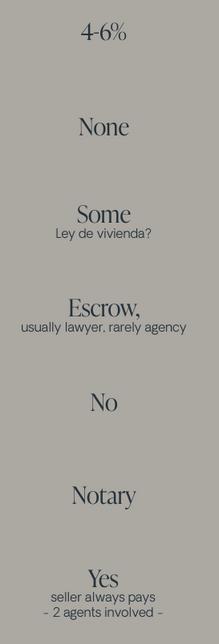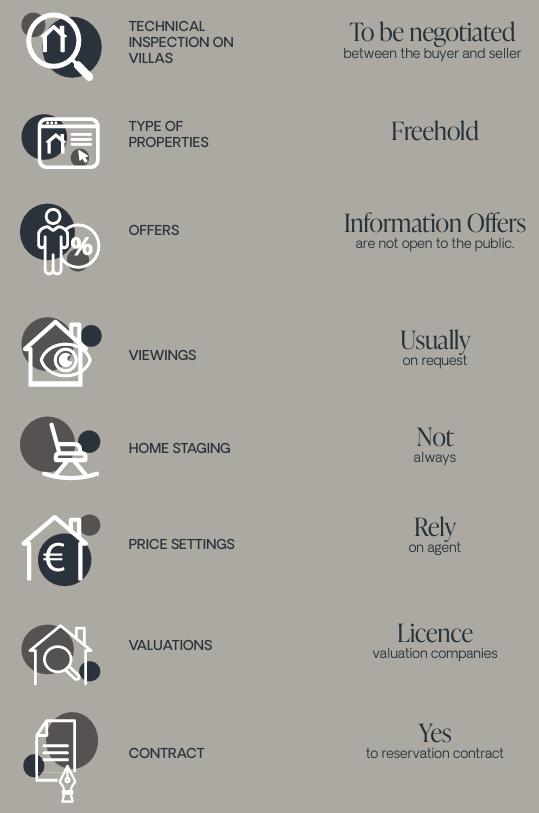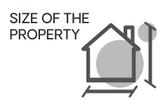The Country Files: Germany
TAKEAWAYS:
In Germanys real estate market, agent commissions typically range from 2% to 7 14% + 19% VAT with the cost shared equally between buyers and sellers since the new regulation that entered into force at the end of 2020 In Germany, real estate agents need to be registered in the chamber of commerce (“Industrie- und Handelskammer, I H K ”)1 and their profession is governed by values like honesty when it comes to providing relevant property information to potential buyers
Notaries play a vital role in verifying the legality of transactions and handling funds Public property information is easily accessible through registries and online portals, provided that you have the permission of the property owner to access it The contractual process involves basically a Notarized Purchase Contract for which preparation the parties inform the Notary about the terms of the agreement like the price
Why they buy in Spain
2nd
6th
4th
The Country Files: Germany
DIFFERENCES
Costa Del Sol and Germany exhibit notable differences in their real estate practices. In Costa Del Sol, agent commissions range from 4% to 6% + 21% VAT, primarily covered by sellers, whereas in Germany, commissions vary from 2% to 7.14% + 19% VAT, with equal sharing between buyers and sellers. While estate agent licenses are not mandatory in Costa Del Sol, in Germany real estate agents need to be registered in the chamber of commerce.
Property information disclosure in Costa Del Sol is partial, whereas in Germany, it is comprehensively regulated by the Civil Code Handling of funds involves escrow, typically managed by lawyers in Costa Del Sol, while in Germany, the notary office ensures transaction legality
Another significant difference is that in Spain, at completion, the title deed is signed by both parties and the remaining price is paid to the seller at the Notary office, from which moment the buyer becomes the new owner of the real estate property, taking physically possession of it In Germany, the parties sign the purchase contract at the Notary, but the buyer doesn’t pay immediately the remainder of the price (especially if bank financing is required), which also delays the moment when the keys are handed over to the new owner, only after the land registry performed the change of ownership4
These variations reflect distinct market practices and legal frameworks in the two regions.
Price Stability and Growth Rates:
Germany: The German real estate market is known for its stability Property prices tend to experience moderate and steady growth with a focus on long-term value
Spain: Spain has experienced more significant price fluctuations, including a property boom followed by a crash in the early 2000s While the market has recovered, it still tends to exhibit more volatility compared to Germany
Cultural Preferences and Housing Types:
Germany: Germans often prefer renting over homeownership, and there is a strong rental market Apartment living, especially in urban areas, is common There's a focus on functional and energy-efficient housing
Spain: Homeownership is culturally significant in Spain, and many people aspire to own their homes The market includes a mix of apartments, single-family homes, and vacation properties, with a higher homeownership rate compared to Germany
Regulatory Environment:
Germany: The German real estate market is known for its transparent and well-regulated environment Property laws are stringent, and there are strong tenant protections The legal process for property transactions is generally efficient
Spain: Spain has experienced regulatory changes in response to the 2008 economic crisis While reforms have been made to improve transparency, the regulatory environment can still be complex, and there may be variations across regions
The Country Files: Germany
DIFFERENCES
Investment Landscape:
Germany: The German real estate market is attractive to investors due to its stability and reliable returns Institutional investors often focus on commercial properties and rental housing
Spain: Spain attracts a mix of domestic and international investors, and there is interest in both residential and vacation properties. The market may present higher risks but also higher potential returns.
Economic Influences:
Germany: The German economy is known for its strength and stability, which positively influences the real estate market. Economic indicators, such as employment rates and GDP growth, play a significant role in property market performance.
Spain: Spain's real estate market is more closely tied to economic conditions, and it can be influenced by factors such as tourism trends, job markets, and overall economic health. The market may be more sensitive to economic fluctuations
COSTA
Tobenegotiated buyerandsellerneedtoagree
Freehold
onlyunderspecificcircumstancesitcanbeleasehold
Notpublic, Throughestateagents Onrequest, Throughestateagents, Appointments,OpenHouseEvents,PrivateViewings
In Germany, property sellers are legally required to provide thorough and transparent information to potential buyers This obligation is governed by German Civil Code, ensuring that buyers receive detailed information about the property they are considering purchasing This includes disclosures about the property's condition, any known defects or issues, as well as any relevant legal and financial information
Verycommon Especiallyinthelastyears
Usually, relyonagent Yes, OnlyNotarizedPurchaseContract
Germany slightly less importance in square metres than in Spain



















